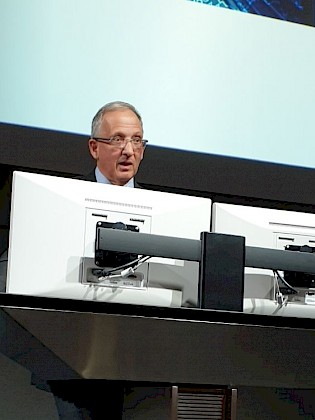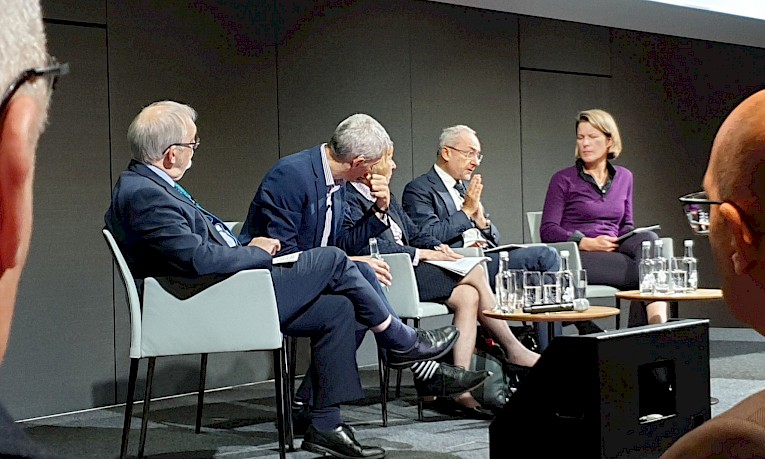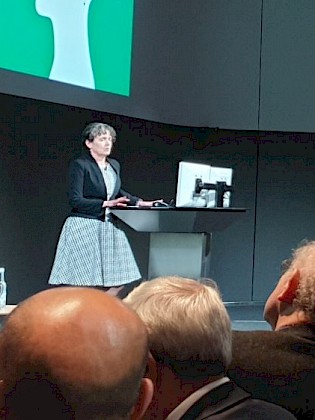14 October 2019 12.00pm - 5.30pm
2019 Annual Conference Report
The UK and Global Outlook - Weak Growth, Policy Changes
The 2019 SPE conference was once again hosted by Bloomberg and moderated expertly by their Head of Economics Stephanie Flanders, who began by noting that economists might now be making greater contributions to real world issues but seemed to be listened to less.

The main part of his speech looked at three challenges to financial stability. The first was that “low for long” was leading to increased risk taking. Reductions in net interest margins had meant it was more difficult for banks to build capital. More generally Sir Jon expressed concern about the rise in corporate leveraged loans to levels similar to before the global financial crisis and about the non-bank financial sector (insurance companies for example) investing in riskier less liquid assets. Risk-taking had risen, resilience had fallen.
Second, while higher debt was more sustainable in a “low for long” world debt accumulation could still make the economy more vulnerable. In a downturn households could cut back more on consumption as a result, and firms on investment. Third, downturns could become more severe as demand management is more difficult when interest rates approach their lower bound. Monetary policy is not powerless, but more tools may need to be used.
In short, while there has been no explosion of debt in this “low for long” world there are risks of asset price corrections to the extent that they are related to unrealistic monetary policy expectations. As a result, the global economy might be more vulnerable to shocks. There was an increased need for strong macro prudential policy and an expansion of the toolkit in this respect.
The global economy was the topic of the day’s first panel discussion, comprising Yael Selfin (KPMG), Rain Newton-Smith (CBI), Randy Kroszner (University of Chicago Booth and ex-FOMC member) and Tom Orlik (Bloomberg Economics). The discussion ranged far beyond GDP forecasts to encompass trade policy and corporate behaviour.
Tom Orlik noted the range of challenges facing global activity, including the weakness of manufacturing and uncertainties related to the US-China trade dispute. Tom’s base case for 2020 involves a degree of détente between the two superpowers, but still anticipates little reacceleration in the developed world. Risks are tilted to the downside, and hinge on potential contamination from weak manufacturing to the global services sector. Randy Kroszner focused on a further threat, in the form of continued strategic rivalry between the US and China. He noted that areas of contention have developed far beyond the narrow issue of bilateral deficits, to include technological security and intellectual property. These issues are harder to address through negotiation, and reflect the concerns of much broader constituencies than just the leaders of the two nations. It seems likely that some form of US-China tension will persist beyond a Trump presidency, leaving an open question about the medium-term economic consequences.
Rain Newton Smith and Yael Selfin discussed a specific case of the impact of political uncertainty, with UK business confidence in poor shape and evidence that investment plans have essentially been placed on hold. It is hard to separate the economic developments from the policy context, given the weakness of the post-referendum trend. However, as Yael noted, headwinds are not restricted to Brexit. She noted that a number of corporate contacts had reported disappointment with previous investment programmes - especially in IT - creating greater caution with regard to future outlays. It seems likely that even with a thawing of manufacturing activity and trade relations, productivity challenges may remain with us much longer.
The panel on the future of monetary policy involved Claudio Borio (BIS), Charlie Bean (ex BoE Chief Economist, currently OBR and LSE), Kate Barker (ex BoE monetary policy committee) and Graham Turner (GFC Economics and advisor to the Labour Party).
Mr Borio began by explaining that central banks’ room for policy manoeuvre was limited and that the larger were central banks’ balance sheets and the lower were interest rates the less effective policy loosening would be on the real economy (in his words, the “cost-benefit calculus deteriorates” when policy is already very loose). The risk of setting a negative rate could be that households don’t understand it and end up saving, not spending, more. Moreover, if loose policies mean higher debt then eventual normalisation could be even harder to achieve.
He did concede that a multitude of measures (such as the package delivered by the ECB in a September 2019) could work better than just one though cautioned that some measures might offset each other in terms of their economic and financial effects. He argued we should be wary about trying to hit inflation targets in the face of “good” global disinflation (i.e. related to technological supply shocks) and that doubling down by raising inflation targets would be a risky strategy. Central banks remits were already ambitious - we should be wary about what central banks can and should deliver.

Charlie Bean began by talking about the technical limits to unconventional monetary policy which theoretically would not be hit until the central bank has bought all the assets in the world (art, fine wines etc). However, expanding unconventional policy brings with it serious political economy questions. There are potential fiscal implications, for example, of buying credit, there are control rights involved in owning equities (which is effectively a part-nationalisation). So finance ministries may need to become more involved should central banks find themselves in the position of having to expand policy further. Charlie agreed with Claudio that the cost-benefit calculus of additional easing had indeed deteriorated as real rates have fallen. But a lower natural real rate also makes fiscal policy a more attractive counter cyclical instrument. So instead of squeezing more room out of monetary policy, Charlie argued in favour of focusing on developing a framework to allow fiscal policy to expand in a limited way. This, he argued, was easier to do in the UK than in the euro area where there are multiple fiscal authorities.
In other remarks Charlie suggested we were asking too much of central banks. Government ought to be taking the lead on climate change with central banks focused on the financial market impact. But such policies should be delivered by political actors and at a global level. Central banks need to take a secondary, but still important, role.
People are right to think about the distributional concerns of unconventional policy. Monetary policy always has distributional effects and over the past decade people have become more alert to this issue as asset holders have been obvious beneficiaries of central bank purchases. It is important that governments should agree on the use of new monetary policy instruments from a distributional point of view before they are deployed by the central bank.
Finally, on the issue of the flatness of the Phillips Curve Charlie half joked that this could actually make forecasting inflation easier. At some point he believes the relationship will reestablish itself and the curve will steepen.
Kate’s remarks about the efficacy of central bank policy was that firing monetary bullets with apparently little economic response could be particularly bad for credibility. As for government support the risk of fiscal loosening is that governments may become addicted to it - though in that case it would be obvious from the markets if a government had indeed gone too far in this respect. Kate found it odd how long it has taken to get some governments to accept the need for stepping up fiscal stimulus.
On the issue of distributional effects of monetary policy Kate argued that we did not really think much about the distributional consequences of policy choices or about how to offset them when asset purchases were first introduced because we never thought that policy would stay so loose for so long. Asset price increases in response to large scale central bank asset purchases are a far more obvious consequence than the effect on the economy at large from central bank actions.
Graham suggested that central banks need to become more ambitious. In particular he argued that there had been too much tinkering at the edges - a focus by central banks of making micro adjustments to their policies in response to small changes one way or another in the monthly flow of economic data. Instead he would prefer central banks to take on some of the bigger challenges, such as how to improve productivity.
He suggested that current economic conditions might be better than policymakers think. Unemployment was at its lowest levels for a long time, wages are rising, technological take-up and business investment in the US had been rapid, and the direct impact of the trade war is likely to be less than some economists think. In terms of central bank policy responses and unconventional monetary policy Graham believes there has been too much tinkering with QE and sees negative rates as a tax on savings. There is a need to shift towards longer-term thinking - in particular in modelling climate change, to which he sees the need for far more resources to be directed, and the reduction of energy costs to help support productivity.

People were generally unaware of what economists do. Most people think economists are forecasters, with fewer respondents in a survey thinking they worked as either advisers to government or in regulation. In reality, the opposite is true. Economists in the banking sector represented less than a fifth of the total. Moreover, and more disappointingly, Rachel noted the share of female undergraduates in economics was among the lowest in any profession, only lower in physics and computing, with female economists more likely to work in the public sector.
George Buckley, SPE
Note from editor: Slide pack for Rachel Griffith’s speech can be downloaded from this page. For a copy of Sir Jon Cunliffe’s speech, please visit the Bank of England website.
Related pages
Speaker Series: Interview with Yael Selfin
Speaker Series: Interview with Sir Ivan Rogers
Related links
Sponsored by: Bloomberg

